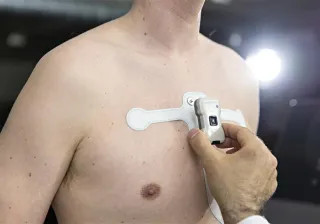Burnout is a growing global phenomenon that becomes emphasised in knowledge work. The pandemic and rapid transition to remote work have further increased stress levels. VTT leads the international Mad@Work project, which examines the possibilities of using artificial intelligence for early detection of work-related stress. At the same time, the project develops new tools for supporting well-being at work.
According to the 2019 Working Life Barometer of the Ministry of Economic Affairs and Employment, one out of three wage and salary earners suffer from mental exhaustion. The exhaustion is caused by prolonged work stress, the causes of which may be related to the work itself or its content, negative interaction at the workplace, or the working environment. In remote work, for example, the lack of contacts, the continuous succession of remote meetings, poor ergonomics and disturbances in the working environment may increase stress. New solutions are needed for detecting work-related stress so that the situation can be addressed in time.
New solutions are needed for detecting work-related stress so that the situation can be addressed in time.
VTT is developing intelligent health and well-being solutions based on top expertise in areas such as artificial intelligence and diagnostic tools. “In the Mad@Work project, we examine methods based on artificial intelligence to detect work stress. For this purpose, we obtain data from motion detectors embedded in the workplace environment and sensors measuring environmental quality, which monitor, for example, changes in the employees’ movements and working conditions. When the data is modelled using algorithms, anomalous behaviour patterns and employees’ state of stress can be identified,” says Johanna Kallio, Senior Scientist at VTT. “Stress also affects the way we use digital devices, which may be analysed using software installed on the device. The state of stress may manifest itself, for example, as an atypical keystroke rhythm or duration of application usage.”
Continuous measuring is challenging especially in remote work, so the Finnish Institute of Occupational Health and VTT will launch a joint pilot on monitoring place-independent well-being at work. When well-being data is collected at the individual level, it is critical that information security and privacy are maintained. The cybersecurity services company Nixu will ensure that the solutions developed in the project are safe and that the individuals involved can always manage their own data.
Any work stress detected must also be made visible. VTT is currently developing a next generation organisation barometer, which will provide means for this. Typically, well-being at work is measured with surveys 1–2 times a year, but the new barometer will allow it to be monitored continuously. Based on the information, it is possible to provide means for supporting the work culture and individual coping at work at the right time. The impacts of the measures taken could also be monitored.
Based on the information, it is possible to provide means for supporting the work culture and individual coping at work at the right time.
In the project, new tools for supporting well-being will be developed with business partners. Hintsa Performance's contribution to the project is strong expertise in supporting individual employees and developing business cultures. Helvar, Martela and UniqAir are developing solutions for a comfortable, efficient and healthy indoor environment. Granlund and Haltian Empathic Building, on the other hand, facilitate overall management of the workplace environment by providing platforms for the integration of different services.
The total budget of the Mad@Work project is EUR 10 million, of which EUR 7.3 million is allocated to research and product development carried out in Finland. The partners involved in the project include Granlund Oy, Haltian Empathic Building Oy, Helvar Oy Ab, Hintsa Performance Oy, Martela Oyj, Nixu Oyj, UniqAir Oy, and the Finnish Institute of Occupational Health. In addition, the project involves a consortium in Spain and Portugal, and partners in Korea and Austria.
Read also blog by Senior Scientist Johanna Kallio: "Stress changes our behaviour – technology embedded in the work environment can identify individual signs of stress"







